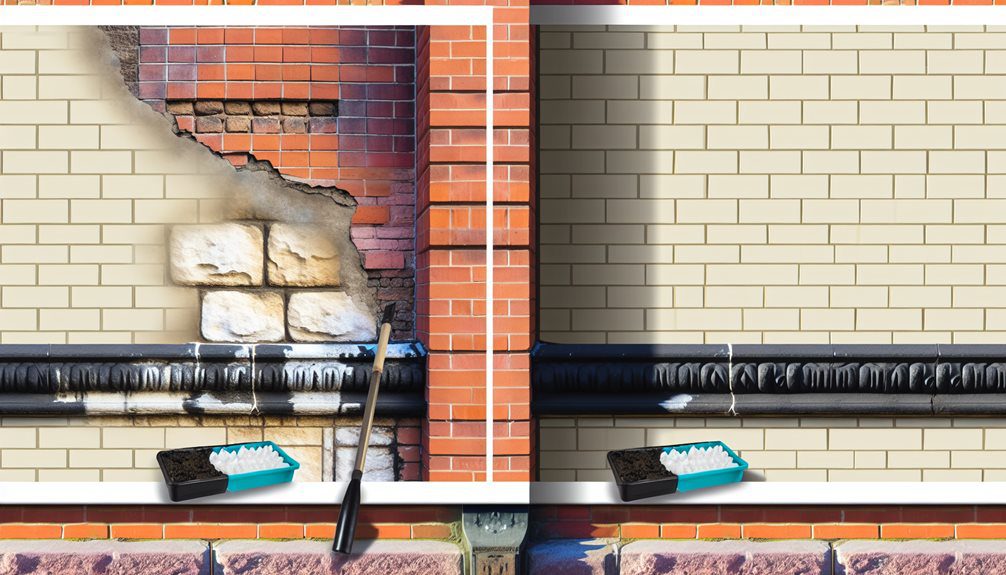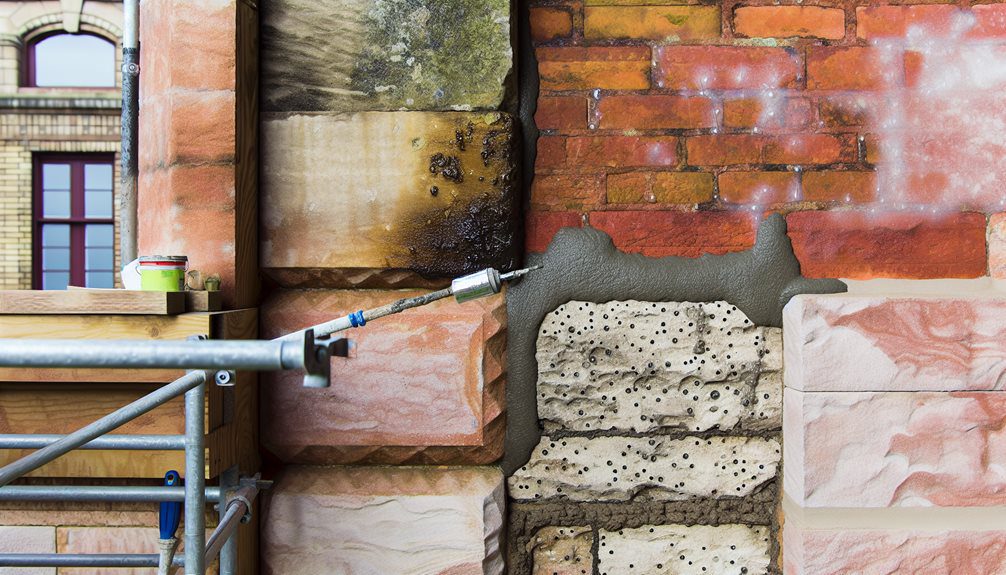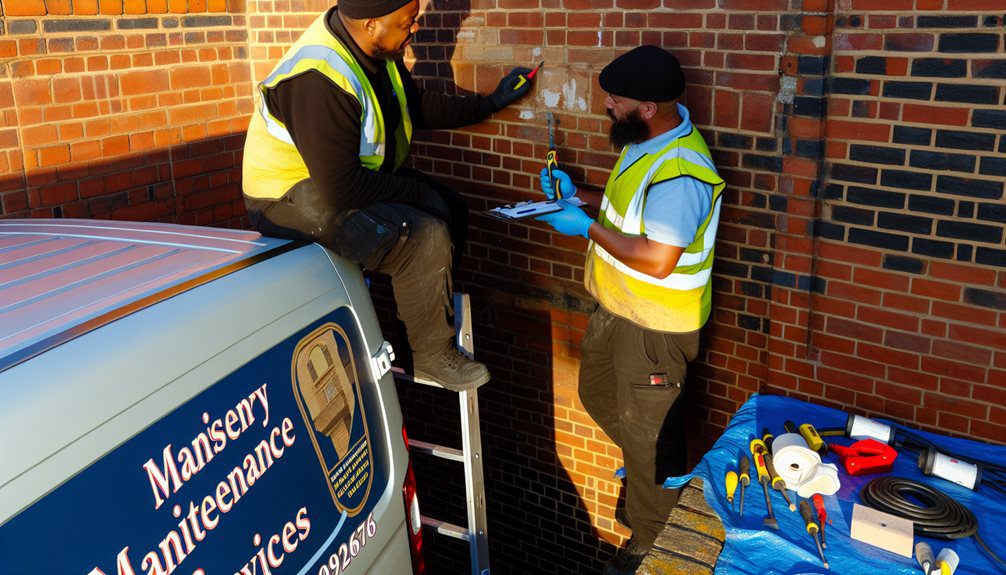Regular masonry maintenance plays an essential role in protecting your commercial property's structural integrity and market value. You'll need to implement systematic inspections focusing on water infiltration, efflorescence, and structural movement throughout all seasons. By establishing routine maintenance protocols, you can prevent catastrophic failures and reduce long-term repair costs by up to 80%. Your property's maintenance documentation strengthens insurance negotiations and helps guarantee building code compliance. Professional masonry services, selected based on proper credentials and experience, should conduct bi-annual evaluations and necessary repairs. The thorough approach you take today determines your property's long-term performance and financial stability.
Understanding Common Masonry Issues
Most masonry problems in commercial buildings stem from three primary sources: water infiltration, structural movement, and material degradation. You'll need to recognize these issues early to prevent costly repairs and maintain your property's value.
Water infiltration manifests through visible dampness, staining, and efflorescence issues. When you spot white, chalky deposits on your masonry surfaces, you're witnessing efflorescence – a clear sign that water is moving through your walls and bringing dissolved salts to the surface. You'll want to address this promptly, as it indicates potential deeper moisture problems.
Structural movement often results in masonry cracks that can compromise your building's integrity. You'll typically find these cracks near windows, doors, or building corners where stress concentrations are highest. Monitor diagonal cracks particularly closely, as they may indicate foundation issues.
Material degradation occurs through freeze-thaw cycles, chemical exposure, and general weathering. You'll notice this through spalling, where the masonry surface flakes or peels, or through mortar joint deterioration. In coastal areas, you'll need to pay special attention to salt-related deterioration, which can accelerate damage to your masonry surfaces. Regular inspections by a professional masonry restoration company can help identify and address these issues before they escalate.
Preventative Maintenance Best Practices
Regular preventative maintenance forms the cornerstone of effective masonry preservation in commercial properties. When you're managing a commercial building, you'll need to establish routine inspection schedules that include monthly visual assessments and bi-annual thorough evaluations of all masonry surfaces.
You'll want to implement professional masonry cleaning techniques at least once every 18-24 months. This includes pressure washing at appropriate PSI levels for your specific masonry type, removing biological growth, and addressing any surface staining. It's essential that you're documenting all cleaning procedures and maintaining detailed records of treatments applied.
As part of your maintenance protocol, you should inspect mortar joints annually, looking for signs of deterioration or water infiltration. You'll need to schedule repointing when mortar degradation reaches 1/4 inch or deeper. Don't forget to examine flashings, caps, and water management systems during these inspections. Additionally, regular maintenance can help identify the need for tuckpointing services early, preventing more extensive damage and costly repairs down the line.
Cost Benefits of Regular Upkeep

Regular masonry maintenance will protect you from catastrophic structural failures that often lead to six-figure repair costs and potential litigation. You'll be able to create accurate long-term maintenance budgets by tracking repair patterns and scheduling preventative work at ideal intervals. Your commercial property insurance rates can decrease by up to 15% when you demonstrate consistent masonry upkeep through detailed maintenance logs and professional inspection records. Additionally, investing in tuckpointing for restoration can significantly enhance the aesthetic appeal and longevity of your masonry structures.
Preventing Major Repair Expenses
Proactive masonry maintenance can save commercial property managers up to 80% in long-term repair costs compared to reactive approaches. When you identify masonry deterioration signs early, you'll prevent minor issues from escalating into major structural problems that require extensive repairs. You'll want to establish a systematic inspection schedule that includes checking for cracking, spalling, efflorescence, and joint deterioration.
Your emergency repair planning should include a dedicated budget for immediate interventions when you spot critical issues. By maintaining detailed records of past repairs and implementing preventive measures, you're protecting your investment and avoiding costly crisis management. You'll find that addressing minor mortar joint repairs, for example, costs considerably less than dealing with water damage that's infiltrated your building's core structure.
Consider developing a three-tier maintenance approach: monthly visual inspections, quarterly detailed assessments, and annual thorough evaluations by certified professionals. You'll extend your masonry's lifespan and maintain your property's value by catching problems before they require extensive reconstruction. Remember, every dollar spent on prevention typically saves you $8-10 in future repair costs. Additionally, regular inspections can help identify tuckpointing for joints that need repair before they lead to more significant issues.
Long-term Budget Planning
A thorough masonry maintenance budget requires strategic allocation across multiple time horizons, typically spanning 5-10 years. You'll need to implement extensive budget forecasting that accounts for both routine maintenance tasks and potential emergency repairs. By tracking historical expense patterns, you can better predict future costs and allocate resources efficiently.
Start by establishing baseline costs for regular inspections, cleaning, and minor repairs. You'll want to include annual increases of 3-5% to account for inflation and rising material costs. Your expense tracking should categorize spending into preventive maintenance, reactive repairs, and capital improvements. This data becomes invaluable when you're planning future budgets and justifying maintenance expenditures to stakeholders.
Consider creating a reserve fund that's specifically dedicated to masonry upkeep. You'll typically want to set aside 10-15% of your annual maintenance budget for unexpected issues. When you're working with other property managers, you'll find this approach aligns with industry best practices. Remember to review and adjust your budget quarterly, ensuring you're maintaining adequate funds for both routine maintenance and potential structural issues that may arise. Additionally, incorporating waterproofing techniques into your maintenance plan can significantly enhance the durability of your masonry structures.
Lower Insurance Premium Rates
Maintaining adherence to strict masonry maintenance protocols can lead to significant reductions in your commercial property insurance premiums. When you're proactive about masonry upkeep, you'll position yourself favorably during insurance negotiation processes, as insurers recognize the reduced risk of structural failures and subsequent claims.
Your documented maintenance program serves as evidence during risk assessment evaluations, demonstrating your commitment to property preservation. You'll find that insurance providers often reward this diligence with preferential rates, particularly when you can show a history of regular inspections, timely repairs, and preventive measures. These records strengthen your position when discussing coverage terms and premium adjustments.
You can leverage your maintenance documentation to highlight specific risk-mitigating actions, such as waterproofing treatments, crack repairs, and structural reinforcements. Insurance underwriters typically view these efforts as indicators of reduced liability exposure. By joining the ranks of property managers who prioritize masonry maintenance, you're not just preserving your building – you're also creating a compelling case for lower insurance costs, which can result in substantial annual savings for your property management budget. Additionally, utilizing high-quality materials during repairs can further enhance the longevity and safety of your masonry work.
Seasonal Inspection Guidelines
Throughout the calendar year, commercial property managers must conduct systematic masonry inspections that align with seasonal changes and weather patterns. You'll need to develop thorough seasonal checklists that address specific concerns for each quarter, ensuring you don't overlook critical inspection points as temperature impacts vary.
In spring, you should examine your masonry surfaces for winter damage, focusing on frost heaving, cracked mortar joints, and water infiltration points. Your summer inspections need to target expansion joint integrity and potential thermal stress damage, while monitoring for efflorescence as moisture evaporates rapidly. During fall, you'll want to verify your drainage systems are clear and identify any areas where water might pool against masonry surfaces before winter arrives. Winter inspections require special attention to ice damming, salt damage, and freeze-thaw cycle effects on your masonry structures. Regular inspections can help identify defective mortar joints that may lead to significant structural issues over time.
Document your findings using standardized forms that track changes over time, allowing you to spot developing issues before they become major problems. You'll find that maintaining detailed records of seasonal variations helps you anticipate and prevent weather-related masonry deterioration, keeping your property in prime condition year-round.
Water Damage Prevention Strategies

You'll need to implement three critical water damage prevention measures to protect your commercial masonry structure from moisture infiltration. Start by thoroughly sealing all building entry points, including windows, doors, and utility penetrations, while maintaining regular inspections of your drainage systems to guarantee gutters and downspouts remain clear of debris. Professional installation of protective flashing around chimneys, parapets, and wall changes will create an effective moisture barrier that directs water away from vulnerable masonry joints. Additionally, engaging in masonry restoration services can help maintain the structural integrity of your building and prevent future moisture damage.
Seal Building Entry Points
Regular inspection and sealing of building entry points serve as critical first steps in preventing water infiltration throughout masonry structures. You'll need to implement thorough weatherproofing techniques around windows, doors, utility penetrations, and expansion joints to maintain your building's integrity. When conducting entry point inspections, you'll want to focus on areas where different materials meet, as these junctions are particularly vulnerable to water penetration.
Start by examining the condition of existing sealants and caulking around all penetrations. You'll find that deteriorated seals often show signs of cracking, separation, or discoloration. Replace any compromised materials with appropriate commercial-grade sealants that match your building's specific requirements. Don't forget to check the flashing systems around windows and doors, ensuring they're properly installed and maintaining their effectiveness.
For best results, you'll want to establish a regular maintenance schedule that includes quarterly entry point inspections. Document all findings and repairs to track patterns of wear and anticipate future maintenance needs. Remember to test the adhesion of new sealants on small areas before full application, ensuring compatibility with your building's masonry surfaces. Additionally, addressing any signs of moisture retention can significantly enhance the longevity of your masonry structure.
Monitor Drainage Systems Regularly
Ensuring proper drainage system functionality stands as a cornerstone of effective masonry protection in commercial buildings. You'll need to implement a thorough drainage system optimization plan that includes regular inspections of gutters, downspouts, and underground drainage networks. By monitoring these systems, you're safeguarding your masonry investments against water-related deterioration.
Your routine maintenance scheduling should include monthly inspections of all drainage components. You'll want to check for debris accumulation, structural integrity of gutters, and proper water flow patterns. During these inspections, you should clear any blockages, realign displaced downspouts, and verify that water disperses correctly away from the building's foundation. Don't forget to examine underground drain tiles and French drains for potential clogs or damage.
You must pay particular attention during seasonal changes when drainage demands typically peak. It's crucial to document all findings and maintenance actions in your building management system. When you identify any drainage issues, address them promptly to prevent water from compromising your masonry structure. Remember, proper drainage maintenance isn't just about preventing immediate water damage; it's about preserving your building's structural integrity for years to come. Additionally, consider consulting with professionals who specialize in masonry restoration to ensure your building remains in optimal condition.
Install Protective Flashing Solutions
Protective flashing installation serves as a critical defense mechanism against water infiltration in masonry structures. When you're managing commercial properties, you'll need to prioritize proper flashing techniques to maintain the building's integrity and prevent costly water damage. Strategic placement of flashing materials at vulnerable points, including window sills, door frames, and roof-wall intersections, creates an effective moisture control system.
You'll want to guarantee your flashing installation follows industry best practices. Begin by selecting appropriate materials such as copper, stainless steel, or high-grade aluminum that match your building's requirements. Install step flashing along wall-roof junctions, through-wall flashing at shelf angles, and cap flashing at parapet walls. Don't forget to incorporate proper overlaps and end dams to direct water away from the building's facade.
Regular inspection of your flashing system should become part of your maintenance routine. Check for signs of deterioration, separation at joints, or loose fasteners. Remember that effective moisture control depends on proper integration between your flashing components and the surrounding masonry. By maintaining these protective elements, you're safeguarding your investment and guaranteeing your building's longevity.
Building Code Compliance
Compliance with local and national building codes forms the foundation of any masonry maintenance program in commercial properties. You'll need to stay current with building regulations that govern masonry structures, as these requirements often change to reflect new safety standards and construction practices. Regular compliance audits of your masonry systems guarantee you're meeting both regional and federal guidelines while protecting your investment.
You must maintain detailed documentation of all inspections, repairs, and modifications to your masonry structures. This includes photographing existing conditions, recording dates of maintenance work, and keeping copies of permits and inspection certificates. When you're planning repairs or renovations, you'll need to verify that your contractors understand and follow the International Building Code (IBC) requirements specific to masonry structures.
Your maintenance program should incorporate periodic reviews of load-bearing capacities, fire resistance ratings, and seismic requirements. You'll want to schedule regular assessments of mortar joint conditions, wall ties, and structural integrity to guarantee continuous compliance. Remember that non-compliance can result in costly fines and liability issues, making code adherence a critical aspect of your property management strategy.
Hiring Professional Masonry Services

Building code compliance relies heavily on skilled professionals, which leads directly to the selection of qualified masonry contractors. When you're undertaking your masonry service selection process, you'll need to verify that potential contractors hold proper licensing, insurance, and certifications specific to commercial masonry work. It's vital to request detailed portfolios showcasing similar commercial projects they've completed.
Your contractor qualifications checklist should include membership in professional organizations like the Mason Contractors Association of America (MCAA) and verification of their experience with your building's specific masonry type. You'll want to evaluate their knowledge of local building codes, safety protocols, and modern restoration techniques. Don't hesitate to request references from other commercial property managers who've worked with them in the past three years.
Before finalizing your selection, confirm they can provide a thorough maintenance plan, including regular inspections, documentation of repairs, and emergency response protocols. You'll also need to verify their crew's training credentials and their ability to maintain proper safety standards while working on your property. Request detailed written proposals that outline their approach to your specific masonry challenges.
Long-Term Property Value Protection
Regular masonry maintenance ties directly into your property's long-term market value and asset appreciation potential. When you invest in consistent masonry upkeep, you're securing your building's structural integrity while simultaneously protecting its market position. Property appreciation relies heavily on the visible condition of your building's exterior, and well-maintained masonry signals to potential buyers and tenants that you've prioritized building preservation.
You'll find that investment longevity in commercial real estate correlates directly with your maintenance strategy. By addressing minor masonry issues promptly, you're preventing the escalation of problems that could greatly devalue your property. This proactive approach helps you maintain competitive rental rates and occupancy levels, which are vital metrics for your property's overall valuation.
Your building's masonry condition affects everything from insurance rates to financing terms. Lenders and insurers often view well-maintained properties as lower-risk investments, potentially resulting in more favorable terms for your business. Additionally, you're positioning your property to weather market fluctuations better when you maintain your masonry to professional standards, as quality-maintained properties typically retain their value even during market downturns.
Frequently Asked Questions
How Long Should Masonry Repairs Typically Last Before Needing Maintenance Again?
You'll find that masonry repair lifespans vary considerably based on several factors. Typically, well-executed repairs should last 15-25 years under normal conditions. Your repair frequency guidelines will depend on exposure levels, climate conditions, and initial workmanship quality. You're looking at shorter intervals (5-10 years) for high-stress areas like chimneys or retaining walls, while protected masonry sections might hold up for 25-30 years between considerable maintenance needs.
Can Existing Masonry Be Matched Exactly When Replacing Damaged Sections?
You'll find that exact masonry matching is achievable through several precise techniques, though it requires expertise. Your contractor can use masonry matching techniques like custom color blending, texture manipulation, and weathering simulation to create a close match. They'll consider repair material options including custom-mixed mortars, specialized brick dyes, and salvaged materials from the same period. While a 100% perfect match isn't always possible, you'll get the best results by working with experienced masons who understand historic preservation methods.
What Insurance Coverage Is Recommended for Commercial Masonry Maintenance Work?
You'll need extensive liability coverage that includes both general and professional liability insurance for masonry maintenance projects. Make sure your contractor carries a minimum of $1-2 million in coverage per occurrence. Additionally, you should verify they have worker's compensation insurance and an umbrella policy. It's wise to require contractors to provide current certificates of insurance before starting any work, protecting you from potential claims or accidents.
How Do Different Air Pollution Levels Affect Masonry Deterioration Rates?
You'll notice that air pollution's impact on masonry varies considerably based on pollutant types. When you're dealing with sulfur dioxide and nitrogen oxides, they'll form acids that accelerate deterioration factors by breaking down calcium carbonate in stone. In urban areas, you're facing faster decay rates due to concentrated industrial emissions and vehicle exhaust. Black crusts often form on your masonry where particulate matter combines with moisture, leading to both structural and aesthetic damage.
Are There Specific Masonry Maintenance Requirements for Historical Commercial Buildings?
When you're maintaining historical commercial buildings, you'll need to follow specific restoration guidelines set by preservation authorities. You must document existing conditions, use period-appropriate materials, and work with certified preservation specialists. Don't forget that you're required to maintain the building's historical integrity while meeting modern safety standards. You'll also need to obtain special permits and follow historical preservation protocols for any repairs or alterations to the masonry structure.